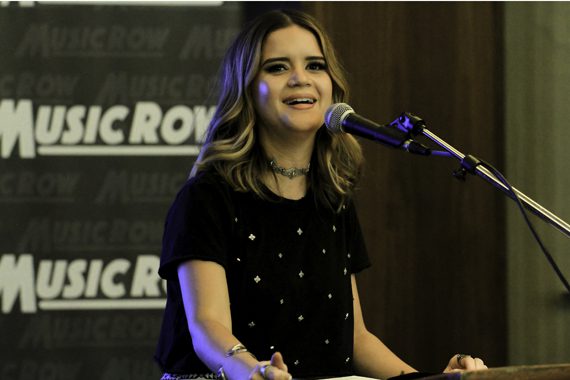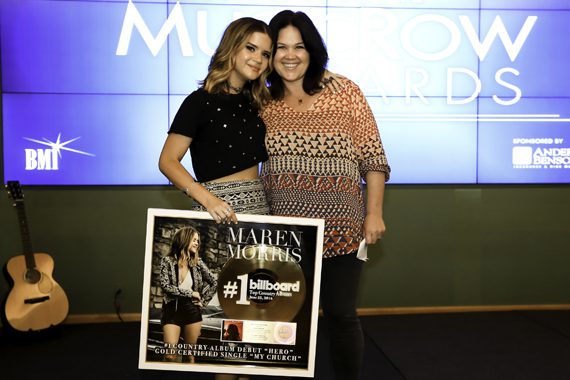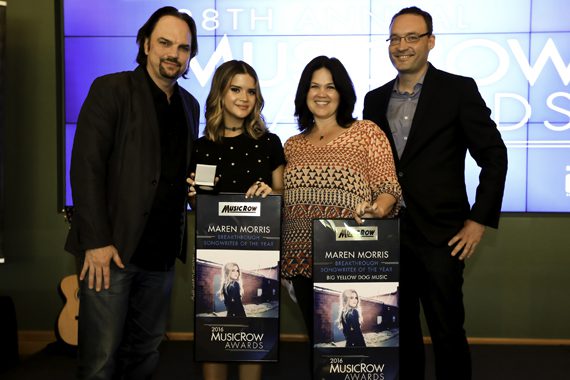
Maren Morris at the 28th Annual MusicRow Awards. Photo: Moments by Moser
Since 2013, Morris has been writing for Nashville publishing company Big Yellow Dog Music, which released a digital EP in late 2015. Columbia Nashville took notice, signed the singer and released her full-length debut, Hero, which debuted at No. 1 after its release on June 3.
Calling from the first night as a special guest on Keith Urban’s Ripcord World Tour, she discussed with MusicRow the launch of her career, as well as the story behind “My Church,” which led her to win of the magazine’s 2016 Breakthrough Songwriter of the Year.
Read more about the award in the 2016 MusicRow Awards print issue, available now.
–––
MusicRow: Describe the path “My Church” took to finally being released.Maren Morris: I wrote it a little over a year ago, I guess March of 2015. I was out on a writing trip in Los Angeles. [Producer/songwriter] busbee has a house in Nashville but is based out of Los Angeles. The day before I wrote with him, the title “My Church” popped in my head and I went in with him and he totally got the concept I was going for.
It was a quick write, probably because it’s such a clear emotional context that everyone can relate to in some way. I instantly knew that song was really special, and felt a strong need to keep it to myself. If I was going to take a whack at this artist thing—if I had one shot at it—I would want it to be with this song. It’s crazy to think that was a little over a year ago. It really catapulted this whole thing to be set in motion.
As a songwriter and artist, how do you decide which songs to hold or let go?
“My Church” was really the first song I wanted to keep for myself. Narrowing down songs for the record was tough because I have a catalog from the last three years of music that I really love—hundreds of songs and I’m sure there are some I have forgotten about completely.
It’s sort of a sacrifice to narrow it down. There are great songs I adore that I had to leave off the record. But with the 11 songs that are on the record, it was hard to imagine someone else singing them and I think it tells a cohesive story.
Did you always want to be an artist and songwriter?
I felt like I was pretty much done with the performance side when I moved to Nashville. I’m from Arlington, Texas, and I toured there for over a decade—I had a whole other life there, really as a kid from about 10 or 11 years old. I didn’t write songs then but that eventually led to getting my first guitar and wanting to write.
After I moved, I just wanted to be a songwriter in a writing room and be creative—not worried about selling anything. Somewhere along the way I missed that high you get when you walk off stage after a show. That is so hard to match. In a writing room you get a different kind of high when you hear something back that you’ve created out of nothing with your friends, but that gave me the gumption to finish out this record.
Talk about the launch of your career.
Everything was sort of a domino effect after my publisher Carla Wallace introduced me to my manager Janet Weir at Red Light Management. At the time I hadn’t even written “My Church.” Around that time Janet and I met and hit it off. She understood the vision I had for my music and what I wanted to say to the world.
Janet tracked down Copeland Isaacson at Spotify, where one thing led to another and I ended up doing an exclusive EP release with them before I had ever signed a deal. That Spotify exclusive really created a lot of leverage. It really set into motion me signing a record deal with Sony.

Big
Yellow Dog’s Carla Wallace (R) surprises her writer Maren Morris (L)
with a plaque commemorating a No. 1 country album debut, along with its
lead single achieving gold. Photo: Moments By Moser Photography
I didn’t have the track listing down, but I had the bulk of the songs written. There were last-minute additions, because I was still writing. Like “Rich,” I think that was one of the last songs I wrote, and it was too much fun to leave off the album and fit so perfectly with the vibe we created.
Why was Columbia Nashville the right place for you?
When I was rounding out the EP, Sony Nashville didn’t have a president. They were going through a transition. They came on board later in the game once Jim Catino played Randy Goodman a few of my songs.
At the time I wasn’t really thinking whether or not I should sign to a pop or country label, but with the Columbia imprint that I’m on, I felt like I got the best of both worlds—I’ve been lucky to have a partnership with New York and Nashville with my deal. I never felt like I had to choose between the two worlds.
Describe that New York component.
Person for person, the same amount of people that work on my team here in Nashville under Columbia, the same goes for the New York office. So if I’m ever overseas or in New York, I feel like they both have a tight grasp on my direction.
It’s nice because I feel like these genre walls are coming down, bit by bit. I’m seeing the New York labels start to have more conversation with their Nashville counterparts. There’s more symbiosis happening and you don’t have to choose between the two. Randy Goodman and Rob Stringer at Columbia Records in New York really get what I do.

Pictured (L-R): Sherod Robertson, Maren Morris, Carla Wallace, Craig Shelburne. Photo: Moments by Moser
No comments:
Post a Comment